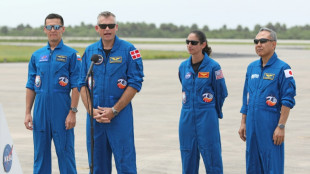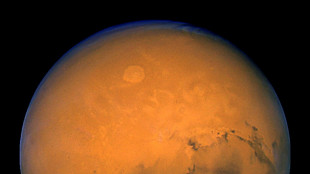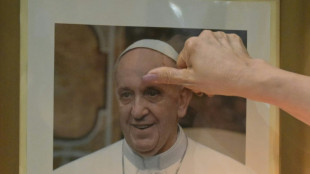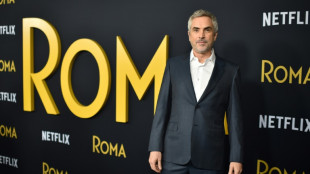
-
 Musk vows to 'fix' X feature over Ukraine and Zelensky
Musk vows to 'fix' X feature over Ukraine and Zelensky
-
Japan's core inflation rate hits 3.2% in January

-
 Chainsaw-wielding Musk savors Trump's return to White House
Chainsaw-wielding Musk savors Trump's return to White House
-
Trump meets with Tiger, PIF and PGA Tour bosses to reunite golf

-
 Roma reach Europa League last 16 as 10-man Ajax scrape through
Roma reach Europa League last 16 as 10-man Ajax scrape through
-
MLS hoping for World Cup buzz in 30th season

-
 Bolivia's Morales launches 4th presidential bid, defying term limit
Bolivia's Morales launches 4th presidential bid, defying term limit
-
Harris Reed opens with 'rebellious' show at London Fashion Week opening

-
 Stocks mostly fall on tepid Walmart outlook, geopolitical worries
Stocks mostly fall on tepid Walmart outlook, geopolitical worries
-
Argentine court dismisses charges against 3 accused in death of singer Liam Payne

-
 Musk in X spat with Danish astronaut over 'abandoned' ISS crew
Musk in X spat with Danish astronaut over 'abandoned' ISS crew
-
Bond franchise shake-up moves spy into Amazon stable

-
 New York seeks hundreds of millions of dollars in 'vaping epidemic' case
New York seeks hundreds of millions of dollars in 'vaping epidemic' case
-
Dybala double leads Roma into Europa League last 16

-
 'Lot of fun' - Vance savors Trump's return to White House
'Lot of fun' - Vance savors Trump's return to White House
-
Mavs' Davis 'making good progress' after adductor strain

-
 Moon or Mars? NASA's future at a crossroads under Trump
Moon or Mars? NASA's future at a crossroads under Trump
-
Bucks' Portis banned 25 games for violating NBA anti-drug policy

-
 England captain Itoje glad of 'Superman' Hill's help against Scotland
England captain Itoje glad of 'Superman' Hill's help against Scotland
-
EU trade chief says tariff reciprocity 'must work for both' sides

-
 Curfew imposed after bomb attacks in Colombia injure six
Curfew imposed after bomb attacks in Colombia injure six
-
Andreeva, 17, stuns Swiatek to reach Dubai semis with landmark win

-
 Wembanyama to miss rest of NBA regular season with blood clot
Wembanyama to miss rest of NBA regular season with blood clot
-
Pope's condition 'slightly improving' on seventh day in hospital

-
 Comeback hero Shami says wicket-taking mindset alive
Comeback hero Shami says wicket-taking mindset alive
-
Spotify adds more AI-generated audiobooks

-
 Alcaraz dumped out by Lehecka in Qatar Open quarters
Alcaraz dumped out by Lehecka in Qatar Open quarters
-
Victor Wembanyama to miss rest of NBA regular season: Spurs

-
 Scotland coach Townsend eager to extend England run as Russell passed fit
Scotland coach Townsend eager to extend England run as Russell passed fit
-
Five things to know about Bond, James Bond

-
 Vance savors Trump's 'fun' return to White House
Vance savors Trump's 'fun' return to White House
-
Bavuma wary of Afghanistan challenge in Champions Trophy

-
 Pope 'sitting up, eating' in seventh day in hospital
Pope 'sitting up, eating' in seventh day in hospital
-
'Fixated' man who approached Raducanu is given restraining order

-
 Hong Kong's oldest pro-democracy party prepares to shut down
Hong Kong's oldest pro-democracy party prepares to shut down
-
Andreeva, 17, stuns Swiatek to reach Dubai semi-finals with landmark win

-
 Mexico says won't accept US 'invasion' in fight against cartels
Mexico says won't accept US 'invasion' in fight against cartels
-
Burundi forces flee DR Congo as conflict sparks refugee wave

-
 Stocks in the red as investors worry about growth and inflation
Stocks in the red as investors worry about growth and inflation
-
Gill ton powers India to win over Bangladesh in Champions Trophy

-
 Ireland match no time to experiment, says Wales coach Sherratt
Ireland match no time to experiment, says Wales coach Sherratt
-
Bomb attacks in Colombia injure six

-
 Netflix says to spend $1 billion producing content in Mexico
Netflix says to spend $1 billion producing content in Mexico
-
Bond franchise shifts to Amazon as Broccoli family steps back

-
 Unfair? Figures belie Trump's claims on EU trade balance
Unfair? Figures belie Trump's claims on EU trade balance
-
Putin hails Russia's huge number of 'terror' convictions

-
 Israel denounces Hamas as 'monsters' for staging of hostage bodies handover
Israel denounces Hamas as 'monsters' for staging of hostage bodies handover
-
Rublev downs de Minaur on eighth match point in Qatar

-
 Teenager kills two women in knife attack at Czech shop
Teenager kills two women in knife attack at Czech shop
-
Trump goads '51st state' Canada ahead of hockey grudge match


UN watchdog chief visits Fukushima as Japan returns to nuclear power
The UN nuclear watchdog chief visited Japan's stricken Fukushima plant on Wednesday, the day after Tokyo approved an energy plan that marks a return to nuclear power to meet growing demand for AI.
The International Atomic Energy Agency (IAEA) is monitoring Japan's efforts to decommission the Fukushima Daiichi plant after a 2011 earthquake-triggered tsunami killed 18,000 people and set off the worst nuclear disaster since Chernobyl.
As IAEA head Rafael Grossi arrived in Japan on Tuesday, the cabinet adopted a plan to increase reliance on nuclear power to help meet growing energy demand from artificial intelligence and microchip factories.
"At a moment where Japan is embarking on a gradual return to nuclear energy in its national energy mix, it is important that this is also done in complete safety and with the confidence of the society," Grossi said after meeting the foreign minister.
Japan had previously vowed to "reduce reliance on nuclear power as much as possible".
But this pledge was dropped from the latest Strategic Energy Plan -- which includes an intention to make renewables the country's top power source by 2040.
Under the plan, nuclear power will account for around 20 percent of Japan's energy supply by 2040, up from 5.6 percent in 2022.
The return to nuclear comes as the country is decommissioning Fukushima Daiichi, a process expected to take decades with the most dangerous part still ahead: removing around 880 tonnes of radioactive debris from the reactors.
Grossi, making his fifth visit to Fukushima, viewed the vast "interim" soil storage facilities near the plant for the first time.
Around 13 million cubic metres of soil and 300,000 cubic metres of ash from incinerated organic material -- enough to fill 10 stadiums -- were scraped from land in the region to remove harmful radiation.
On Wednesday, trucks and construction vehicles went back and forth between several areas where hundreds of large soil-filled black bags were stacked, some covered by a thin layer of snow.
Hanging on a locked fence around the storage site was a sign displaying the radiation level.
- Seafood bans -
Japan plans to recycle roughly 75 percent of the soil -- the portion with low radioactivity -- for building projects such as road and railway embankments.
The remaining material will be disposed of outside the Fukushima region ahead of a 2045 deadline.
Stripping topsoil was "very effective" to decontaminate land close to waterways, said Olivier Evrard, research director at France's Atomic Energy Commission.
But the operation was expensive, "generated a massive amount of waste and still poses fertility issues" for agriculture, he told AFP.
It stands in contrast to the decision to fence off a large area after the 1986 Chernobyl disaster and more or less "leave it to wildlife", Evrard said.
Experts from the IAEA and countries including China and South Korea will also take new seawater and fish samples from Fukushima on Wednesday.
Plant operator TEPCO began discharging 1.3 million tonnes of groundwater, seawater and rainwater, along with water used for cooling the reactors, into the sea in 2023.
The water release is endorsed by the IAEA and TEPCO says all radioactive elements have been filtered out except for tritium, levels of which are within safe limits.
However, countries including China and Russia have criticised the release and banned Japanese seafood imports.
China said in September it would "gradually resume" importing seafood from Japan but this has yet to begin.
J.Horn--BTB

